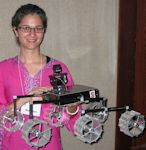
The Scholarship recipients 2011 Information is from the applications
Nöel has always wanted to be an astronaut. As she wrote in her application, "I see the exploration of space as an attempt to answer the ultimate questions concerning our origins and significance in the universe while laying down a framework for our future." She has a B.S.E., Engineering, from Duke; a M. Phil. from the University of Cambridge; and a M.S., Aeronautics and Astronautics, from Stanford.
One of her professors called her "highly motivated, hardworking, uniquely gifted, and a natural organizer." Another noted that Nöel "challenged me good-naturedly when I glossed over important details." Still another noted her "irrepressible and endearing enthusiasm" and her "coherent vision of purpose for her career the likes of which I have never observed in a student."
At the 2011 Asilomar, Noel delivered a most entertaining and informative presentation about the universe (Mars in particular) and our progress in exploring and understanding it. She even brought a remote control explorer vehicle that had been produced at Stanford, along with a video of it working its way over rocks and things. Truly a delightful example of what great things our scholarships can produce. More here...
The title of Maya's dissertation explains her investigation: "Testing Form and Function: Ecological and Morphological Specialization in Mantis Shrimp." Her early results already run counter to the expectation that form follows function in suggesting that "smashers" actually consume a wider range of prey types than "spearers" do. Much of her research is done in Panama at the Smithsonian Tropical Research Institute's Galeta Marine Lab.Maya de Vries, UC Berkeley, Integrative Biology
Letters of recommendation note that Maya is "bright, creative, resourceful, dedicated, and unusually hard-working," "curious and inquisitive with outstanding interpersonal skills" (she was adept at involving local Panamanian students and support staff in her research program), and that she "was fearless . . . in conducting her field experiments in crocodile-laden waters and in truly challenging living conditions."
Jenny is studying algae blooms (i.e., "red tides"), which seem to be expanding globally and causing more economic losses than had been thought.Jenny Lane, UC Santa Cruz, Ocean Sciences
Her research shows that both ocean upwelling and river flow are influential in causing the algae blooms. The research has primed a ground-breaking statewide effort at a time of significant funding shortfalls, with the California Ocean Protection Council awarding $792,000 for implementation of her models as part of a California-wide effort to develop a harmful algal bloom forecast system.
According to her professors, Jenny is "constantly asking What is the big picture?" She is doing "truly interdisciplinary work at the interface between policy, management, and science." She is "a dream student."
Michael is investigating "The Land Question: Special Economic Zones and Accumulation by Dispossession in India." His study contrasts two strategies of development: state-led high modernization revolving around massive projects (e.g., dams) and market-driven projects associated with Special Economic Zones. Basically, this is a study of conflicts over land, land use, and government policies, dispossession with and without develop-ment that benefits the original landowners.Michael Levien, UC Berkeley, Sociology
His professors call him a "consummate, intrepid, imaginative ethnographer," a "tireless researcher and devoted theorist," and a person who "weds intellectual sophistication and civic idealism with economic and political realism."
Feng-Yen's dissertation is "The Etiologies of Primary Immunodeficiencies," in which she defines the molecular basis of immunodeficiency in children with congenital abnormalities of the immune system. Her research has led to the discovery of a second messenger role for magnesium in biology that is particularly important for T-cell activation and the development and function of a normal immune system in humans.Feng-Yen Li, UC San Francisco, Biomedical Sciences (M.D./Ph.D.)
As her professors note, she is a "tenacious, creative researcher" and is "flexible in her thinking." Even more important, she has made "one of the most important discoveries in the past several years" in this area. "Her work will lead to a revision of the textbooks."
In his opening statement, Shane noted that "the initial impetus for my career in medicine . . . [came from] the death of the man who raised me: my grandfather. In fact, a five-gallon metal pail became my primary inspiration." This pail, which held his grandfather’s catheter bag, served as a physical reminder of his prostate cancer.Shane Morrison, Stanford, Medicine
Shane's current work is on treating diabetic wounds through gene therapy. He combines a passion for scientific research with an interest in public health, often volunteering in public health clinics.
His professors call him "clear thinking, energetic, and enthusiastic," with "great initiative and creativity," "impeccable integrity," and "extraordinary energy and enthusiasm." There are "not enough superlatives to describe Shane."
Wei-chun Wang, UC Davis, Psychology
His focus is on the physical components of be-havior: using neuroimaging and neuropsychological methods to test the hypothesis that the perirhinal cortex contributes to conceptual priming. "His research has challenged strongly held beliefs in our field."
His professors note that he combines "drive, mental horsepower, and creative spirit." He is "modest, friendly, easy-going" and an "independent thinker [yet a] team player" who is "an exceptionally clear communicator" "liked by everyone in the lab."
helsea Wood, Stanford, Biology
Chelsea is studying the impacts of fishing on tropical marine ecosystems. As she noted in her application, "Fishing is among the most economically important human uses of the world's oceans, but it may come with costs [we haven't] accounted for." Her research takes advantage of the presence of a pristine, unexploited fish community on Palmyra Atoll, where she is monitoring experimental treatments that simulate "pristine" and "fished-out" conditions on the atoll. She hopes that her work will permit the development of baselines for ecosystem function and service provision throughout the U.S. Pacific Remote Islands Marine National Monument, the Republic of Kiribati, and other Pacific island groups.
"Exceptional" was often used in her letters of recommendation: "exceptionally talented," "exceptionally motivated," "simply exceptional." Her "logical and technical rigor" was also commended
